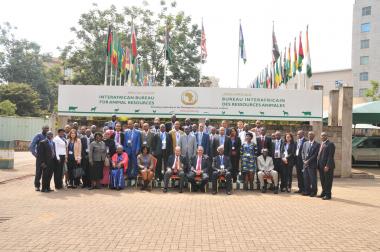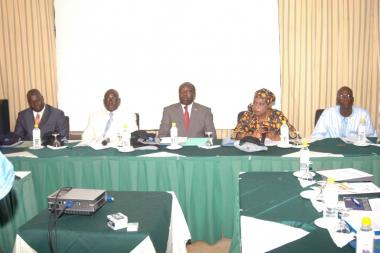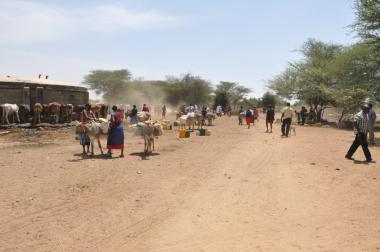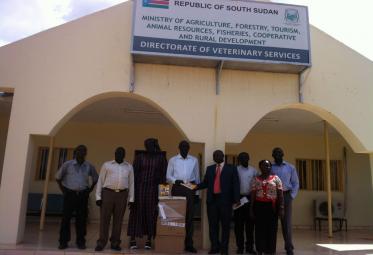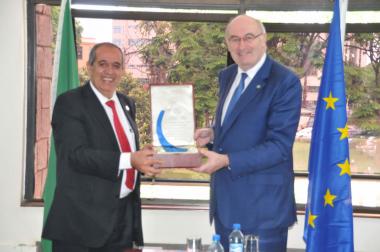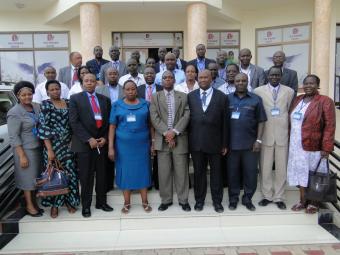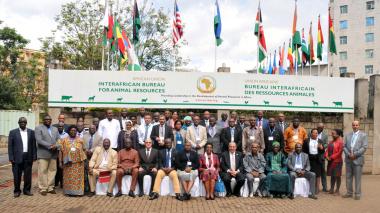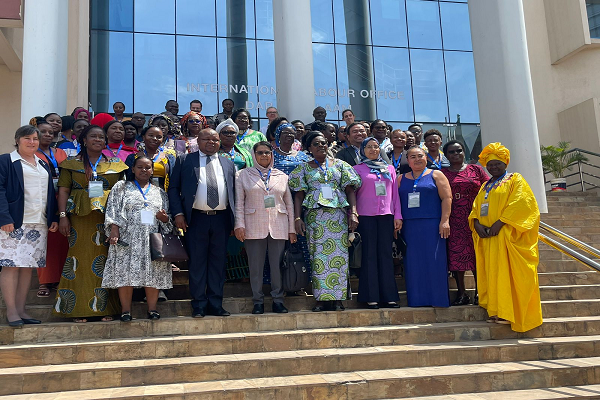
The African Union, represented by AU-IBAR and AUDA-NEPAD, is partnering with the Food and Agriculture Organisation (FAO) at a dynamic assembly convened in Dar es Salaam, Tanzania, from December 5th to 7th, 2023. The three institutions are holding a regional capacity-building workshop targeted at empowering women's groups, associations, and cooperatives in Africa's small-scale fishing sector. During the event's inauguration, Dr. Bernice Mclean, the Acting Head of Blue Economy at AUDA-NEPAD, highlighted the crucial role of women in driving sustainable fisheries management and aquaculture development across the continent. Professor Silas Shemdoe, the Permanent Secretary of the Ministry of Livestock and Fisheries, officiated the opening ceremony. In his address, Prof. Riziki Silas Shemdoe emphasized the pivotal roles of good governance in organizations and the influence of social norms. His insightful words underscored the interconnectedness of effective organizational governance and societal well-being, setting a guiding tone for the workshop.
A Crucial Juncture for Empowerment
This collaborative workshop, orchestrated by the African Union and FAO, marks a crucial juncture for like-minded partners dedicated to empowering citizens to steer their own development agendas. Dr. Mclean extended sincere gratitude to the United Republic of Tanzania for hosting this significant event, acknowledging the country's commitment to innovation and the reinforcement of governance over aquatic resources under the leadership of President Samia Suluhu Hassan, Africa's sole female leader.
Focusing on Women’s Involvement
Dr. Mclean underscored the critical importance of women's participation in Africa's transformation, referencing Agenda 2063: The Africa We Want. Despite 12.3 million individuals engaged in Africa's fisheries and aquaculture, women constitute only 27.3% of this workforce. Their contributions, especially in post-harvest activities like processing, play a crucial role in ensuring food security and generating household income.
Recognizing the marginalization faced by women in this sector, the workshop highlighted strategic policy frameworks such as the AU’s Policy Framework and Reform Strategy for Fisheries and Aquaculture (PFRS) and Africa’s Blue Economy Strategy, emphasizing gender as a key cross-cutting objective. However, women's contributions often remain underrecognized, prompting a call to action.
Taking Action: Empowering Women in Fisheries
The Joint Conference of African Ministers for Agriculture, Rural Development, Fisheries, and Aquaculture in 2014 recognized this disparity and urged member states and regional bodies to promote empowerment schemes, expand domestic markets for fish, and strengthen the capacity of fish stakeholders along the value chain. Responding to these calls, initiatives like the African Women Fish Processors and Traders Network (AWFishNET) were established in 2017, with a focus on enhancing the welfare, working conditions, and income of women in the fisheries sector.
Continued support from the African Union through AU-IBAR and AUDA-NEPAD has propelled AWFishNET's growth across the continent, concentrating on capacity-building, technology adoption, and advocacy strategies to ensure women's visibility and access to investment and trade opportunities. This initiative aligns with ongoing efforts to leverage the African Continental Free Trade Area Agreement (AfCFTA) to strengthen regional integration and trade, emphasizing the need for gender-sensitive systems supporting local production and fair-trade practices.
The Road Ahead: Expected Outcomes and Participants
The regional workshop aims to strengthen the organizational and developmental capacities of women's groups, associations, and cooperatives in African small-scale fisheries. Participants are expected to identify opportunities to enhance collective action and organizational capacities through various measures, including technical knowledge strengthening, governance enhancement, and financial education.
The workshop, led by Dr. Bernice Mclean from AUDA-NEPAD and Mrs. Nyabenyi Tito Tipo, the FAO Representative in Tanzania, will aim to bolster capacities within Africa's small-scale fisheries sector, particularly focusing on women's groups and cooperatives. The agenda is meticulously crafted to encompass crucial topics like gender equality, women's rights, and female leadership, aligning with the implementation of Small-Scale Fisheries Guidelines. Discussions will ensue on business planning, simplified accounting, and network capacity building to tackle challenges in fish trading. The workshop will also delve into field visits to women's groups and associations, providing practical insights. The workshop will also feature sessions on credit savings groups, innovative financing, group entrepreneurship, investment plans, and strategies for advocacy and awareness. The workshop will culminate in evaluations and plans for future actions in collaboration between the African Union and the Food and Agriculture Organization.
Approximately seventy participants, representing women's groups, organizations, and cooperatives, have engaged in this collaborative effort. The workshop will serve as a platform to strengthen connections between women's groups, facilitating the exchange of experiences and drawing valuable lessons from shared challenges and successes.
Women in African Fisheries: A Vital Pillar
In Africa, women play a crucial role in small-scale fisheries and aquaculture sectors, contributing significantly to value chains from canoes to markets. Despite representing 50% of the inland fisheries workforce in West Africa and marketing 80% of all fish products, women face challenges due to traditional beliefs and gender-based constraints. Organized in groups, associations, or cooperatives, women prove to be more efficient in fishing activities, providing opportunities to increase income and improve working conditions.
Advocating for Gender Equality in Fisheries
Women's involvement in the fisheries value chain is often overlooked in project and policy designs, hindering the realization of their full potential. The establishment and strengthening of women's organizations emerge as a crucial intervention point to increase visibility, representation, negotiating power, and access to resources, markets, and decision-making processes. Empowering women in fisheries not only contributes to gender equality but also fosters sustainable and equitable fisheries.
As Dr. Mclean noted earlier, this workshop serves as a pivotal moment, reflecting collaborative strides towards gender inclusivity, empowering women within African fisheries, and steering the continent towards sustainable and equitable development. The expected outcomes of this workshop are geared towards fostering collective action and learning, marking a significant step forward in the empowerment of women in African small-scale fisheries.

